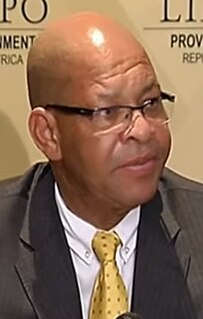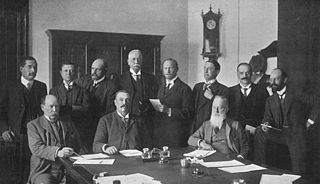External links
| Wikisource has original text related to this article: |
- Official text (PDF)
| Constitution Fourth Amendment Act of 1999 | |
|---|---|
| Parliament of South Africa | |
| |
| Enacted by | Parliament of South Africa |
| Assented to | 17 March 1999 |
| Commenced | 19 March 1999 |
| Legislative history | |
| Bill | Constitution of the Republic of South Africa Third Amendment Bill |
| Bill citation | B123—1998 |
| Introduced by | Valli Moosa, Minister of Provincial Affairs and Constitutional Development |
| Amends | |
| Constitution of the Republic of South Africa, 1996 | |
| Amended by | |
| Citation of Constitutional Laws Act, 2005 (amended short title) | |
The Fourth Amendment of the Constitution of South Africa made two technical changes relating to the calling of provincial elections and the choice of delegates to the National Council of Provinces. It was enacted by the Parliament of South Africa, signed by Acting President Thabo Mbeki on 17 March 1999, and came into force two days later. It was signed and came into force simultaneously with the Fifth Amendment; the two amendments were separated because the Fourth involved provincial matters and had to be passed by the National Council of Provinces while the Fifth did not.
The Act made two technical modifications to the Constitution. The first was to clarify that, when the term of a provincial legislature is due to expire, the Premier may issue the proclamation calling an election either before or after the term actually expires. The Fifth Amendment made the same change for elections to the National Assembly. The second was to modify the formula for the allocation of delegates' seats in the National Council of Provinces to parties.
The official short title of the amendment is "Constitution Fourth Amendment Act of 1999". It was originally titled "Constitution of the Republic of South Africa Amendment Act, 1999" and numbered as Act No. 3 of 1999, but the Citation of Constitutional Laws Act, 2005 renamed it and abolished the practice of giving Act numbers to constitutional amendments.
| Wikisource has original text related to this article: |
A constitutional amendment is a modification of the constitution of a polity, organization or other type of entity. Amendments are often interwoven into the relevant sections of an existing constitution, directly altering the text. Conversely, they can be appended to the constitution as supplemental additions (codicils), thus changing the frame of government without altering the existing text of the document.
Fourth Amendment may refer to the:

The Constitution of South Africa is the supreme law of the Republic of South Africa. It provides the legal foundation for the existence of the republic, it sets out the rights and duties of its citizens, and defines the structure of the Government. The current constitution, the country's fifth, was drawn up by the Parliament elected in 1994 in the South African general election, 1994. It was promulgated by President Nelson Mandela on 18 December 1996 and came into effect on 4 February 1997, replacing the Interim Constitution of 1993. The first constitution was enacted by the South Africa Act 1909, the longest-lasting to date. Since 1961, the constitutions have promulgated a republican form of government.

The National Council of Provinces (NCOP) is the upper house of the Parliament of South Africa under the (post-apartheid) constitution which came into full effect in 1997. It replaced the former Senate, but is very similar to that body, and to many other upper houses of legislatures throughout the world, in that its purpose is to represent the governments of the provinces, rather than directly representing the people.
The Premier of North West is the head of government of the North West province of South Africa. The current Premier of the North West is Job Mokgoro, a member of the African National Congress, who was appointed in June 2018. He took office on 22 June 2018.

The Premier of the Northern Cape is the head of government of the Northern Cape province of South Africa. The current Premier of the Northern Cape is Zamani Saul, a member of the African National Congress, who was elected in the 2019 election. He took office on 22 May 2019.
The Premier of Mpumalanga is the head of government of Mpumalanga province in South Africa. The current Premier of Mpumalanga is Refilwe Mtsweni-Tsipane, a member of the African National Congress, who was appointed in March 2018. She took office on 20 March 2018.

The Premier of the Western Cape is the head of government of the Western Cape province of South Africa. The current Premier of the Western Cape is Alan Winde, a member of the Democratic Alliance, who was elected in the 2019 election. He took office on 22 May 2019.
In South Africa, a Premier is the head of government of one of South Africa's nine provinces. The Premier of a province plays for that province a role similar to that played by the President for the country as a whole.

The Premier of the Free State is the head of government of the Free State province of South Africa. The current Premier of the Free State is Sisi Ntombela, a member of the African National Congress, who was appointed in March 2018. She took office on 27 March 2018.

The Premier of Gauteng is the head of government of the Gauteng province of South Africa. The current Premier of Gauteng is David Makhura, a member of the African National Congress, who was elected in the 2014 election. He took office on 21 May 2014.

The Premier of Limpopo is the head of government of Limpopo province of South Africa. The current Premier of Limpopo is Stanley Mathabatha, a member of the African National Congress, who was appointed in July 2013. He took office on 18 July 2013.
The Fifth Amendment of the Constitution of South Africa made two technical changes, one relating to national election procedures and the other to the membership of the Financial and Fiscal Commission. It was enacted by the Parliament of South Africa, signed by Acting President Thabo Mbeki on 17 March 1999, and came into force two days later. It was signed and came into force simultaneously with the Fourth Amendment; the two amendments were separated because the Fourth involved provincial matters and had to be passed by the National Council of Provinces while the Fifth did not.
The Sixth Amendment of the Constitution of South Africa made a number of changes, most importantly giving the title of "Chief Justice" to the head of the Constitutional Court instead of the head of the Supreme Court of Appeal. It was passed by the National Assembly with the requisite two-thirds majority on 1 November 2001, and signed by President Thabo Mbeki on 20 November; it was published and came into force on the following day.
The Seventh Amendment of the Constitution of South Africa made various changes involving the financial management of national and provincial government. Most of its provisions came into force on 26 April 2002, and the remainder on 1 December 2003.
The Eighth Amendment of the Constitution of South Africa allowed members of municipal councils to cross the floor from one political party to another without losing their seats. It came into force on 20 June 2002, and was effectively repealed on 17 April 2009 by the Fifteenth Amendment.
The Ninth Amendment of the Constitution of South Africa modified the scheme for the allocation of seats in the National Council of Provinces, to account for the possibility of changes in the party makeup of provincial legislatures. This was necessary because of other legislation which had been introduced to allow members of the provincial legislatures to cross the floor without losing their seats. It came into force on 20 June 2002, and was effectively repealed on 17 April 2009 by the Fourteenth Amendment.
The Tenth Amendment of the Constitution of South Africa altered the provisions relating to membership of the National Assembly and the provincial legislatures, to allow members of those bodies to cross the floor at certain times without losing their seats. It came into force on 20 March 2003, and was effectively repealed on 17 March 2009 by the Fourteenth and Fifteenth Amendments.
The Eleventh Amendment of the Constitution of South Africa renamed the Northern Province to Limpopo, altered the procedure for intervention by the national government in a failing provincial government and intervention by a provincial government in a failing municipality, and expanded the powers of the provincial executive when it intervenes in a municipality.

The National Convention, also known as the Convention on the Closer Union of South Africa or the Closer Union Convention, was a constitutional convention held between 1908 and 1909 in Durban, Cape Town and Bloemfontein. The convention led to the adoption of the South Africa Act by the British Parliament and thus to the creation of the Union of South Africa. The four colonies of the area that would become South Africa - the Cape Colony, Natal Colony, the Orange River Colony and the Transvaal Colony - were represented at the convention, along with a delegation from Rhodesia. There were 33 delegates in total, with the Cape being represented by 12, the Transvaal eight, the Orange River five, Natal five, and Rhodesia three. The convention was held behind closed doors, in the fear that a public affair would lead delegates to refuse compromising on contentious areas of disagreement. All the delegates were white men, a third of them were farmers, ten were lawyers, and some were academics. Two-thirds had fought on either side of the Second Boer War.